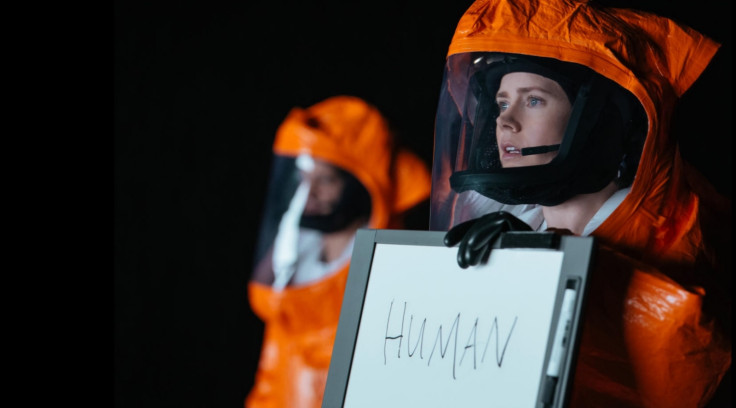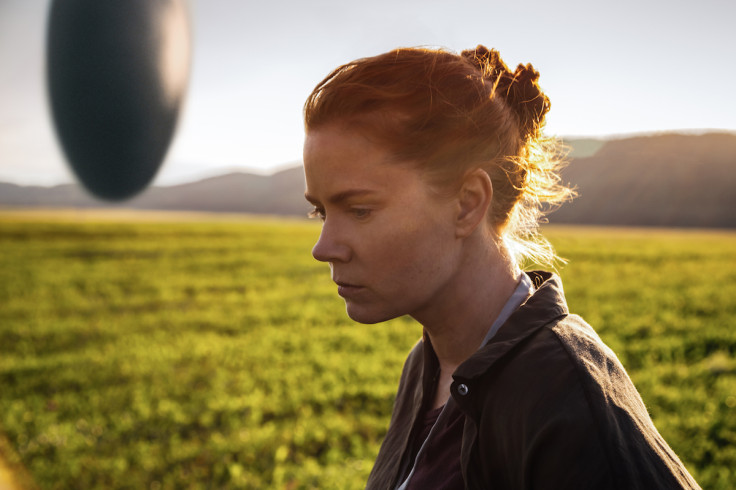Arrival review: Denis Villeneuve's sophisticated sci-fi shows others how it's done
Amy Adams and Jeremy Renner star in the drama which features aliens but is all about humanity.

Following on from mystery crime thrillers Prisoners and Sicario, French-Canadian director Denis Villeneuve once again manages to put humans front and centre in sci-fi drama Arrival, starring Jeremy Renner and Amy Adams. By refusing to play to typical sci-fi tropes, the filmmaker sidesteps the usual constraints and presents a surprisingly emotional and heartfelt story which explores themes as broad as relentless optimism, romance, fear, grief and the meaning of life.
In the film, Adams plays linguistics professor Dr Louise Banks, who is recruited by the military when 12 shell-shaped aircraft descend upon Earth and station themselves in numerous, seemingly random locations all around the world. As expected, the ships turn out to contain aliens and Louise is tasked with translating their language so that the government can work out why they are here.
With the help of theoretical physicist Ian Donnelly (Renner), Louise soon discovers that while the aliens do make noise, their primary method of communication is through imagery; inky circular illustrations that they produce through their tentacles when Louise and the crew visit them in their shells during premeditated time-slots every 18 hours. Rather preposterously, Louise quickly deduces that the aliens 'sentence structure' isn't linear and each image represents an abstract idea or thought, with different parts of each composition meaning specific words.
But as Louise begins to break down the barrier between humans and the aliens, she starts to receive vivid flashbacks from staggered aspects of her daughter's life; from her birth and her playful, younger years to her tragic death from a terminal illness as a teenager. Troubled, Louise must find a way to make sense of her loss while also trying to prevent a potential global war.
When someone asks you what you'd expect from a decent sci-fi movie, we'd hazard a guess that you would respond by saying something along the lines of; 'impressive CGI, a mind-bending story and some badass aliens' thrown in for good measure. Along the way, it seems as if cinemagoers have almost come to believe that those are the basic ingredients to satisfy our nerdy brains, haven't we? But while we might have got used to that idea, Villeneuve takes a vastly different approach with Arrival and pushes the boundaries on what a sci-fi film really can be.

While this might seem like an overly bold statement to diehard Christopher Nolan fans, Arrival seems to do exactly what Interstellar did with the genre... but better. Like the latter, the former uses science-fiction themes to create a doomsday set-up. However, instead of turning the film into a race-against-time, action-packed spectacle where the characters must save the world (even though Louise and Ian do, kind of, have to), this film is able to spawn a beautifully subtle yet incredibly powerful look at love, connections and the human condition itself as the characters respond to the events.
It's assumed that the aliens, or heptapods as they're known in the film, come from space but the characters never go there as they have no reason too. In fact, all of the film's 'action' takes place on the ground, with scenes seeing Louise and the rest of the crew routinely going from their enclosed military camp tents to the alien's shell via jeeps and aerial work platforms. There's a need for hazmat suits at first, granted, but once the team realise the air pressure inside the shells is stable, they get rid of them, further emphasising the closeness we as viewers have with the characters on screen. There are no space helmets or harsh equipment coming between us here.
Whether it be mere coincidence or a case of a viewer reading to much into it, Arrival seems to speak volumes in its silence than scenes filled with dialogue and Eric Heisserer's script allows for many such moments. Its in these instances that Adams shines, through glorious, close-ups of her expressive face. You can almost hear Louise's brain ticking away as all different feelings – both good and bad – consume her, even when she's doing something as simple as writing on a whiteboard. Renner has similar qualities about him too, with his kind face and humour ensuring that you warm to a character that could have been easily reduced to a socially inept and cold figure.

While Arrival's focus is clearly on insular, more personal stories rather than the typical sci-fi spectacle of 'saving the world,' you do get a subtle sense of threat. But then again, it's not necessarily the aliens that pose such a danger to humanity but the world itself, and the idea that countries could cause their own ruin by not working together in a time when they so evidently need to – as US Forces and Banks discover more and more about the heptapods. Consequently, this ensures they become more open to the species.
Even if those themes seem a little cliché, Villeneuve refuses to dumb things down for audience, never once spelling anything out too soon... or even at all. On occasion, the almost trippy qualities of the film border on confusing – most evidently during one of the final scenes which sees Adams conversing with the heptapods inside a light-filled white void. However, as the film is so heavily rooted in metaphors and the philosophical, as a viewer, you don't mind. You come away thinking about how that particular scene made you feel rather than whether it made sense – so it works.
'Why are they here?' the posters for the film asks. Well, while the film might not necessarily answer that question in the most straight-forward, technical or pragmatic way, what it does manage to explore wonderfully is why we are here instead. And isn't that a much more interesting question anyway?
© Copyright IBTimes 2025. All rights reserved.






















